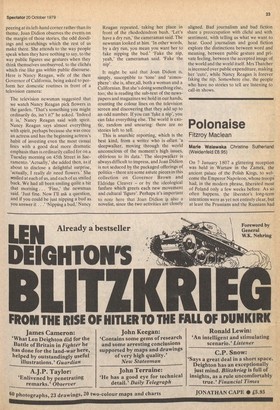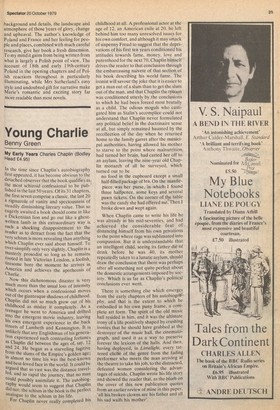Polonaise
Fitzroy Maclean
Marie Walewska Christine Sutherland (Weidenteld £8.95) On 7 January 1807 a glittering reception was held in Warsaw in the Zamek, the ancient palace of the Polish Kings, to welcome the Emperor Napoleon, whose troops had, in the modern phrase, liberated most of Poland only a few weeks before. As so often happens, the liberator's long-term intentions were as yet not entirely clear, but at least the Prussians and the Russians had been chased out and to most Poles it seemed reasonable to hope that their country's recently extinguished independence would now be resuscitated. And so the flower of Warsaw society flocked to throng the brilliantly lit drawing-rooms of the Zamek and gaze at the legendary conqueror on whom the country's future depended.
Napoleon kept them waiting and then made a characteristically abrupt entry. At first he looked bored. Then curious onlookers saw his face 'soften into a smile'. `Ah, y a de joiies femmes a Varsovie', he said as he stopped in front of Countess Walewska, just 20 and married to the 71year-old Count Anastase Walewski, the Court Chamberlain, who stood at her side. Rising from her curtsy, Marie Walewska, young, engaging and elegant in diamonds and a form-fitting blue velvet dress that matched her eyes, met the full force of what Stendhal called 'cc regard fixe et profond a la fois'. Later, onlookers, missing nothing, noticed the Emperor standing in a window recess with Talleyrand and pointing at the Walewsk is. 'Who is she?', he was heard to ask.
It was to be the beginning of one of the most famous love affairs in history. Ten days later Marie was Napoleon's partner at a no less splendid ball given by Talleyrand and the morning after Marshal Duroc, Chief of the Imperial Household, delivered at her house a great sheaf of flowers and a letter covered with green imperial seals which left the Emperor's intentions in no doubt. 'I saw no one but you', he wrote. 'I admired only you; I want no one but you; I beg you to reply promptly to calm my ardour and my impatience. Napoleon'. Apart from any personal inclination she might have felt towards this legendary hero who at 37 had conquered Europe ('Power% he would say, 'is the greatest of all aphrodisiacs') Marie was a Polish patriot. By becoming Napoleon's mistress, as she very soon did, despite her scruples, she was, she firmly believed, striking a blow for her country's independence. This was as It might be. But soon she was deeply in love with him, happy to be summoned to East Prussia or Austria or wherever his campaigns might take him and happy three years later to become the mother of his son Alexander, obligingly accepted as his own by the aged Count Walewski. Happy, too, after the decline of his fortunes, to follow him to Elba where they might have pursued their idyll for any number of years, for he, too, in his way was still in love with her. But fate and Napoleon's goat de l'imposs.ible intervened and the couple went their respective ways, he to Waterloo and St I lelena and she, having divorced Walewski, to marriage with Napoleon's dashing young Corsican cousin General Philippe Antoine Ornaro and, as it turned out, to an early death. The story, given the dramatis personae., is by any standards a fascinating one. Christine Sutherland tells it exceptionally well, placing it in historical perspective and evoking with vividness and skill the physical background and details, the landscape and atmosphere of those 'years of glory, change and upheaval. The author's knowledge of Poland and France and her feeling for people and places, combined with much careful research, give her book a fresh dimension. To my mind it gains from being written from what is largely a Polish point of view. The account of 18th and early 19th-century Poland in the opening chapters and of Polish reactions throughout is particularly illuminating, while Mrs Sutherland's easy style and undoubted gift for narrative make Marie's romantic and exciting story far more readable than most novels.








































 Previous page
Previous page